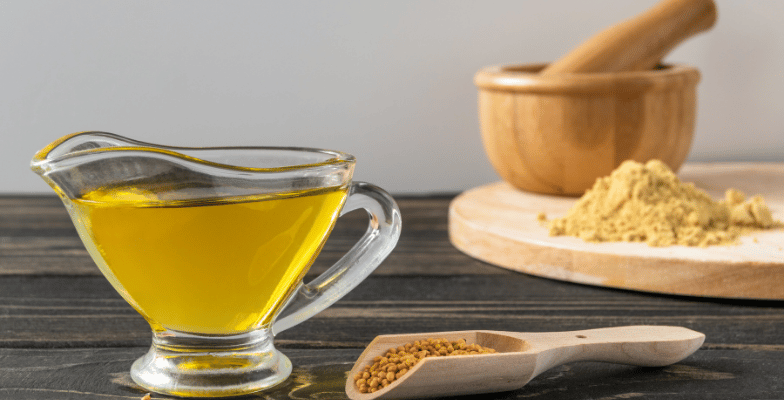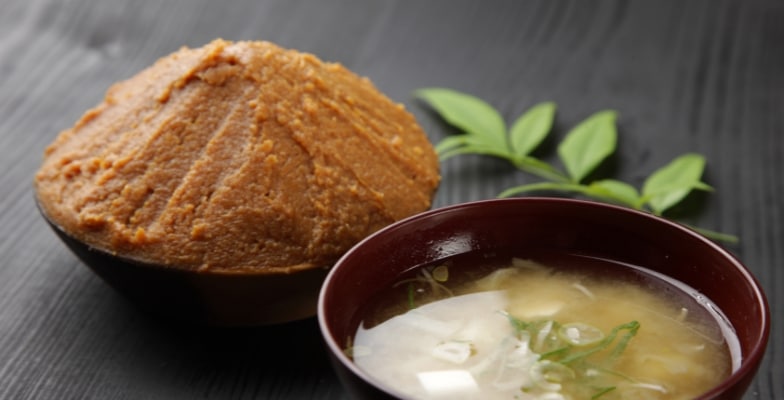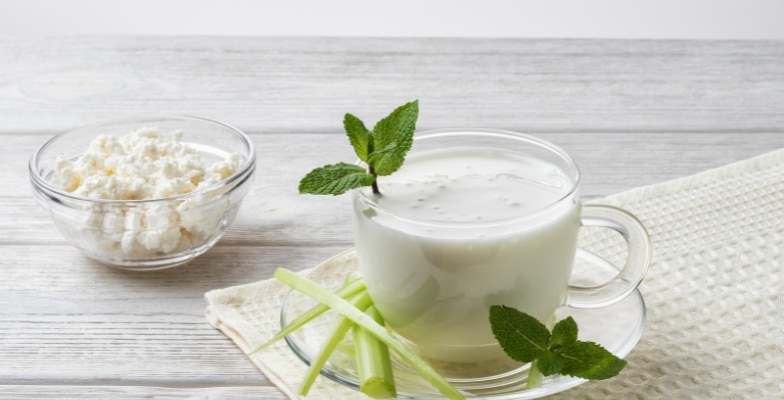Is Mustard Oil Good For Health?
- What Is Mustard Oil?
- Mustard Oil Nutrition Facts
- Mustard Oil Health Benefits
- Mustard Oil Risks And Side Effects
- Conclusion And My Recommendation

If a list of the most debated food ingredients was prepared, mustard oil would undoubtedly grab a spot. A popular subject among researchers, mustard oil, has been widely studied. While some of them conclude mustard oil is healthy, some say it’s harmful to health.
In the late twentieth century, because vegetable oils had become widely available, mustard oil’s popularity declined in Northern India and Pakistan.
What Is Mustard Oil?
Mustard oil comes from the seeds of the mustard plant. People have been using it for a long time, especially in North and East India and other Asian countries. Mustard oil has a unique pungent taste due to a compound called allyl isothiocyanate. 1https://pubchem.ncbi.nlm.nih.gov/compound/Allyl-isothiocyanate
Controversies arose because mustard oil often has a high amount of erucic acid. 2https://pubchem.ncbi.nlm.nih.gov/compound/Erucic-acid There are two kinds of mustard oil, pressed oil and essential oil. Pressed oil, as the name suggests, is obtained when mustard seeds (black, brown, or white) are pressed to get the oil.
In 1970, studies conducted on rats suggested that high doses of erucic acid can harm the heart. However, recent experiments revealed that rats could not process erucic acid properly. Also, rat symptoms during high ingestion of erucic acid were not seen in pigs, monkeys, and other animals. 3https://web.archive.org/web/20081203120159/, 4http:/www.foodstandards.gov.au/_srcfiles/Erucic%20acid%20monograph.pdf
In humans, there have been no reported cases of ill health effects of erucic acid. Despite this, the 1970 rat studies prompted governments worldwide to ban oils with high erucic acid levels.
In the U.S., the FDA (Food and Drug Administration) has banned the use and import of mustard oil for cooking, though mustard oil products with low levels of erucic acid are allowed. 5https://www.accessdata.fda.gov/cms_ia/importalert_89.html
Essential oil is extracted by grinding the mustard seeds and soaking them in warm water before distillation. Mustard essential oil is very fluid and light-colored. It is spicy and pungent due to the allyl isothiocyanate in brown and black mustard seeds.
Because mustard essential oil is strong, it may irritate the skin and mucous membranes if not used in the right amount. However, the FDA permits this oil for cooking because of its low level of erucic acid content.
Mustard Oil Nutrition Facts
According To USDA, 100g Of Mustard Oil Provides 6https://fdc.nal.usda.gov/fdc-app.html#/food-details/172337/nutrients
Calories- 884
Total fat- 100.0g
Carbohydrates- 0.0g
Fiber- 0.0g
Protein- 0.0g
The Fat Composition Per 100g Is
Saturated fatty acids- 11.582 g
Monounsaturated fatty acids (MUFA)- 59.187 g
Polyunsaturated fatty acids (PUFA)- 21.230 g
Mustard Oil Health Benefits
Mustard Oil May Boost Heart Health
Research suggests that a diet containing monounsaturated fatty acids can reduce cardiovascular disease risk. 7https://www.researchgate.net/profile/Peter_Jones30/publication/49824076_Dietary_Monounsaturated_Fatty_Acids_Are_Protective_Against_Metabolic_Syndrome_and_Cardiovascular_Disease_Risk_Factors/links/00b4951a5136e78de0000000.pdf
Mustard oil contains monounsaturated fatty acids (MUFAs), which can boost heart health when added to food by lowering the risk of ischemic heart disease, according to a study published by the American Journal of Clinical Nutrition. 8https://academic.oup.com/ajcn/article/79/4/582/4690142
A systematic review also found that people consuming MUFAs had lower blood pressure and a lower body fat percentage. 9https://www.karger.com/article/FullText/334071 High blood pressure and a large amount of body fat is a curse for heart health.
The essential mustard oil has antibacterial and antifungal properties. It is known for its ability to fight bacterial and fungal infections both externally and internally. 10https://pubmed.ncbi.nlm.nih.gov/25474051/
Externally, essential mustard oil can be applied to wounds to help prevent infections. Internally, it may help fight bacterial infections in the colon, intestines, and other digestive tract parts.
Due to its allyl isothiocyanate content, an essential mustard oil also possesses antifungal properties. 11https://pubmed.ncbi.nlm.nih.gov/30925355/ It may, therefore, stop or prohibit the growth of fungus on and in our bodies.
Research reported in the Journal of the College of Physicians and Surgeons states that a mixture of mustard and honey effectively kills dental bacteria and may be useful as a root canal treatment. 12https://europepmc.org/article/med/15456545
Remember allyl isothiocyanate, a compound found in mustard oil? Recent studies conducted on mice with colitis suggest that this compound reduces colon inflammation. 13https://journals.plos.org/plosone/article? Mustard oil has a significant amount of selenium and anti-inflammatory properties. 14https://www.sciencedaily.com/releases/2005/11/051114112959.htm
In Asian countries, mustard oil is used as a massage oil to treat arthritis, decrease chest inflammation from pneumonia and bronchitis, and for body aches and pains. When the body or joints are massaged with warm mustard oil, it helps reduce inflammation caused by asthma or joint pain. 15http://ierj.in/journal/index.php/ierj/article/view/1835
Mustard Oil Bolsters Skin And Hair Health
The oil has loads of vitamin E, an essential nutrient for the skin. When applied to the skin, mustard oil can act as a sunscreen, protecting the skin from UV rays and pollution. It may even reduce fine lines and wrinkles.
Mustard oil has sufficient omega-3 fatty acids and beta-carotene, which may trigger hair growth. In addition, its antibacterial properties may prevent scalp infection and keep hair healthy.
Mustard Oil Risks And Side Effects
As mentioned earlier, pure unprocessed mustard oil contains high levels of erucic acid, which one study found to be a threat to the cardiac health of rats. However, recent studies suggest erucic acid doesn’t pose a threat to humans. 16https://www.efsa.europa.eu/en/press/news/161109[/mfn One study found that mustard oil adulterated with argemone oil can potentially damage or kill red blood cells. 16https://pubmed.ncbi.nlm.nih.gov/17280492/
Conclusion And My Recommendation
For a long time, mustard oil has been a go-to oil in Asian culture, not only for cooking but also for massage and grooming. The gifts of mustard oil include cardiac health benefits, reduced pain and inflammation, healthy hair and skin, and protection against bacteria and fungus.
Nevertheless, some investigations show that mustard oil with a high degree of erucic acid may also pose dangers to health, especially for younger children. I am a North Indian, where mustard oil has been part of our cooking for ages, and I have never heard about any mustard oil’s adverse effects.
Mustard oil has a high amount of MUFA and PUFA, which are great for our hearts. Unlike most vegetable oils, mustard oil has a high smoke point, which means it is very stable at high heat, preventing free radicals. Further, mustard oil maintains an ideal ratio of omega-3 to omega-6.
Related Article: Unsaturated Fats: Good or Bad?
When purchasing mustard oil, look for the term Cold Pressed or Kachchi Ghani, as this ensures the maintenance of taste and nutritional qualities of the oil in the best possible way. Also, avoid mustard oil adulterated with argemone oil; the combination is highly toxic.
I believe there are a variety of health benefits we can get from mustard oil without any harm. So, it’s a big thumbs up to mustard oil from me.
What do you think about this article? Have any questions? Let me know in the comments below!

Skill-Based Education.
Global Recognition.
Powerful Community Building
Secure a certificate of completion in as little as a day by graduating from one of our free courses.
Get Access to Our Free Courses. No Credit Card Required.

Fabulous Body Membership
Your All-Access Pass to A Fabulous Body & A Rewarding Career
25+ Certificate Courses & Programs, All Included
15 Day Free Trial, 100% Money-Back Guarantee
About Rohit Kumar
Rohit Kumar is an avid writer who puts a lot of his emotions in words through his articles. Today, he is a certified fitness expert with a vast knowledge on nutrition and has contributed to the pages of Fabulous Body with his articles.











Well written, but i don’t get the terms like MUFAji and PUFAji. Pls, before giving terms like these little definiton will really be helpful.. Readers like me who don’t have Science background usally end up struggling with these terms.
Hi Sumit,
Thank you for your valuable feedback. I will take your suggestion and try to implement the same from the next time 🙂 and nice one there with MUFAji and PUFAji 😉
And for your query, MUFA is MonoUnsaturated Fatty Acids, and PUFA is PolyUnsaturated Fatty Acids.
You know Sumit, there are three kinds of fat, Saturated fat (solid at room temperature, e.g., butter, coconut oil)
Unsaturated fat (liquid at room temperature, e.g., mustard oil)
And Trans fat (present in small amt. in nature often human-made and worst kind of fat, yet added in food for a longer shelf life, we should avoid this fat )
And MUFA and PUFA are the two kinds of unsaturated fat. Hey, to know more about unsaturated fat read this article https://fabulousbody.com/unsaturated-fats-good-or-bad/
And stay tuned for more informative content 🙂